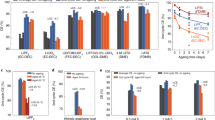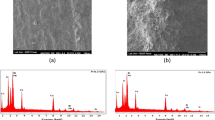Abstract
To explain the characteristic avoidance of etching on an electropolishing anode, Hoar and Mowat1,2 postulated the formation upon it of a compact solid film, dissolving at its outer surface as fast as it is formed anodically from the metal. We believe we have now obtained direct evidence of the presence of such a film during the electropolishing of copper and α-brass anodes in the 50/50 v/v orthophosphoric-acid/water bath.
This is a preview of subscription content, access via your institution
Access options
Subscribe to this journal
Receive 51 print issues and online access
$199.00 per year
only $3.90 per issue
Buy this article
- Purchase on Springer Link
- Instant access to full article PDF
Prices may be subject to local taxes which are calculated during checkout
Similar content being viewed by others
References
Hoar, T. P., and Mowat, J. A. S., Nature, 165, 64 (1950).
Hoar, T. P., and Mowat, J. A. S., J. Electrodepositors' Tech. Soc., 26, 7 (1950).
Author information
Authors and Affiliations
Rights and permissions
About this article
Cite this article
HOAR, T., FARTHING, T. Solid Films on Electropolishing Anodes. Nature 169, 324–325 (1952). https://doi.org/10.1038/169324b0
Issue Date:
DOI: https://doi.org/10.1038/169324b0
This article is cited by
-
The role of mass transfer in the kinetics of anodic dissolution of gas-evolving metallic surfaces
Journal of Applied Electrochemistry (1980)
-
Electrochemical machining
Journal of Applied Electrochemistry (1977)
-
Mechanism of Electropolishing
Nature (1953)
Comments
By submitting a comment you agree to abide by our Terms and Community Guidelines. If you find something abusive or that does not comply with our terms or guidelines please flag it as inappropriate.



